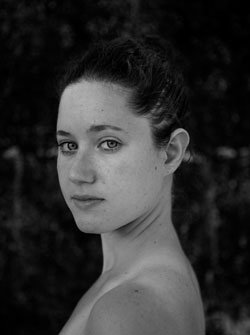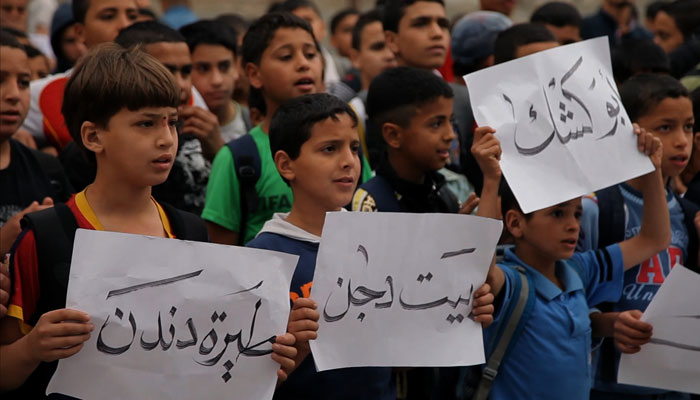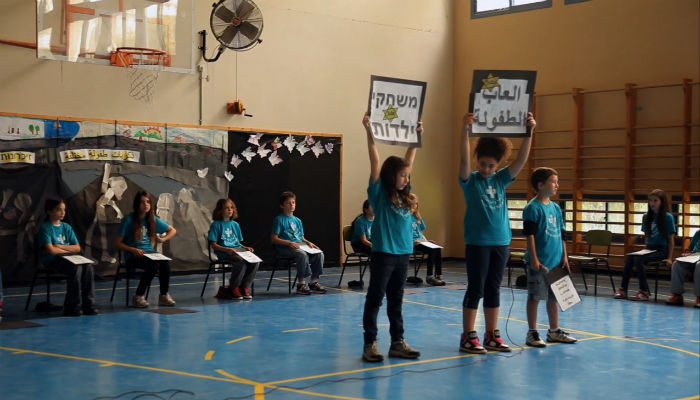“Education is the most powerful weapon which you can use to change the world,” said Nelson Mandela. Tamara Erde’s first feature-length film, This is My Land, examines how the shared, complex, and charged history of Israel and Palestine is taught to the next generation in this volatile region. Does it fuel conflict or encourage peace? How much freedom does the Ministry of Education give teachers? Through dialogues, debates, and field trips at six independent schools, this fascinating documentary observes how young minds are shaped by what is said and what is unspoken.
Please describe This Is My Land in your own words.
Tamara Erde: This Is My Land follows several Israeli and Palestinian teachers over one academic year. Through observing their exchanges and confrontations with students, debates with the ministry’s curriculum and its restrictions, the viewers obtain an intimate glimpse into the profound and long-lasting effect that the Israeli/Palestinian conflict transmits onto the next generation.
Through intimate portraits of history teachers and close observations of their pupils, the film reveals the different approaches of the two public education systems in teaching the complex and charged narrative of their country’s history.
The chosen schools are set in locations that emphasize the changing daily life of the conflict—in Jerusalem, the North of Israel, Nablus, Ramallah and a colony. The film interweaves the stories of the teachers and their classes in parallel, constructing for the viewer the different and sometimes opposing universes of the teachers and their schools. The teachers share their beliefs, motivations, and dreams, in dialogue with students in and outside the classroom, at national ceremonies, at special school events and on school trips.
What inspired you to tell this particular story?
Tamara Erde: Only a few years after graduating, I began to understand how partial and selective was the history taught to me in school about my country. Having been born and raised in Israel, I was educated in the Israeli system until I finished high school and went to the army. It was only later, during my army service, that I started to doubt and question the ‘facts,’ history and values that I had learned in school.
During my army service, which took place during the second Intifada in 2002, I began to see up close the Israeli army’s operational methods in the operations held against the Palestinians. This was, for me, the first blinking of a red light, an alarm of sorts. But more time needed to pass before I discovered just how ‘blind and ignorant’ I was in terms of my knowledge about the “other side,” and the history of my country and area. Several years later, I found myself wondering, “How could I have never doubted before what I was taught?”
This is My Land is your first feature documentary. How did you transition from more experimental works to a social issue non-fiction film about teaching history in Israel?
Tamara Erde: For me every topic indicates its own medium and so I apply the specific means of treating it. I wanted to do this quest about my history and the history I was taught, and chose to do it in a documentary feature. But the process I went through, the discoveries and questions I had, can also inspire a next project that may be fictional or abstract and vise versa.
Many people feel that educating children to be tolerant is a powerful step towards an understanding of different cultures. Do you feel the teachers in your film believe this as well, or do they feel daunted by the challenge?
Tamara Erde: I believe that the teachers in my film do believe they can change their pupils’ perception and conduct. Each of them, even when the outside circumstances are hard, in his/her way, tries to go on and teach what they believe will enable this openness and change for their pupils..
How do you personally feel the future of teaching history in the region will evolve? Are you yourself hopeful or has making this documentary made you more anxious about how future generations will get along?
Tamara Erde: I believe that even though it isn’t evident to keep on believing and being optimistic today, things can and will change. These children I filmed, their way of thinking, their questions and dreams, show that with the right guidance and education, things can change for them, and they will be able to change things.
Do you have one piece of advice for aspiring filmmakers?
Tamara Erde: Go on…
What would you like HIFF audiences to take away from your film?
Tamara Erde: The idea of doubting. Doubting and re-examining what they think of knowing, believing, what they have learned or still learn about the world around them. And to always put themselves also in the other’s place.
We are honored to have you in attendance at HIFF 2014. What are you most looking forward to at the Festival?
Tamara Erde: As this is the film’s U.S. premiere, I’m looking forward to meeting the American audience with this film for the first time, and to hearing their responses and feedback. The film, whose sales agent is Films Transit, is also looking for local and international distributors.
Making its US premiere at HIFF 2014, This is My Land screens in both the Films of Conflict and Resolution program and the Golden Starfish Awards: Documentary Feature competition. Find tickets.
 Tamara Erde is a French-Israeli filmmaker who graduated from Bezalel Academy in Jerusalem and later attended the Le Fresnoy Film School in France. Her three short films—Rober; Jericho (in competition at the Clermont Ferrand International Film Festival, 2011); and Disney Ramallah (Boston Palestinian Film Festival, Un festival c’est trop court!, Festival du Film de Sarlat)—successfully played at several festivals. Erde is currently developing the feature film One Day My Father Died. She is also editing a documentary, produced by the French production company Artline, about the Massacre of Deir Yassin for the Israeli channel TV8.
Tamara Erde is a French-Israeli filmmaker who graduated from Bezalel Academy in Jerusalem and later attended the Le Fresnoy Film School in France. Her three short films—Rober; Jericho (in competition at the Clermont Ferrand International Film Festival, 2011); and Disney Ramallah (Boston Palestinian Film Festival, Un festival c’est trop court!, Festival du Film de Sarlat)—successfully played at several festivals. Erde is currently developing the feature film One Day My Father Died. She is also editing a documentary, produced by the French production company Artline, about the Massacre of Deir Yassin for the Israeli channel TV8.







